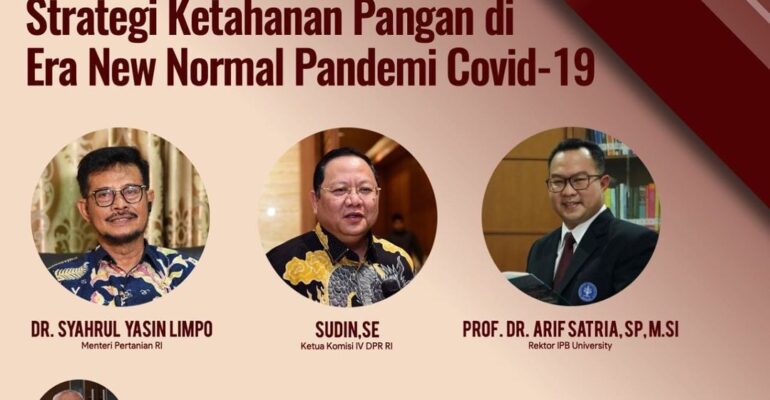Business Talks Series # 5: Food security strategy in the New Normal Era of the COVID 19 Pandemic

Business Talks Series # 5: Food security strategy in the New Normal Era of the COVID 19 Pandemic
Jakarta, June 9, 2020 – The DPR RI Expertise Agency and the IPB University Business School (SB-IPB) are collaborating to hold a Webinar on the topic “Food Security Strategies in a New Era Normal Covid-19 Pandemic “on Tuesday (9/6), discussed the Covid-19 pandemic that has hit Indonesia since February 2020 which has had an impact on various sectors, one of which is the agricultural sector because it is a sector that fulfills people’s basic needs such as food needs. which includes food agriculture, livestock, vegetables and fruits, and plantations. The agricultural sector is very important during the Covid-19 pandemic because it is closely related to food security.
In this webinar, there were speakers, namely 1) Minister of Agriculture, Dr. Syahrul Yasin Limpo who raised the topic of “Government Policy in Ensuring Food Security in the New Normal Era of the Covid-19 Pandemic; 2) Chairman of Commission IV DPR-RI, Sudin, SE, talks about “Implementation of the Supervision and Legislation Function of the House of Representatives in Ensuring Food Security in the New Normal Era of the Covid Pandemic19”; and 3) Rector of IPB University, Prof. Dr. Arif Satria, SP., M.Si. delivered a topic about “Higher Education Innovations to Ensure Food Security in the New Normal Era of the Covid-19 Pandemic”. Acting as moderator, namely the Dean of SB-IPB, Prof. Dr.Ir. Noer Azam Achsani, MS. This webinar is open to the public and attended by various stakeholders consisting of the legislature, executive / government, lecturers, students, business practitioners, and people with various types of professions.
Food security is one of the important things during the Covid-19 pandemic because it can lead to various problems including disruption in production, distribution and consumption of basic necessities due to the imposition of large-scale social restrictions and travel restrictions for the community. This condition can trigger concern if Indonesia will experience a food crisis. This is reinforced by the opinion of the World Food and Agriculture Organization (FAO) which conveyed the threat of food scarcity during the Covid-19 pandemic.
“There are 3 main agendas during the Covid-19 pandemic, namely the first is an emergency / short-term agenda consisting of food price stability including price control, farmer financing facilities and labor-intensive agriculture; the second is a temporary / medium agenda of local food diversification, supporting deficit areas and anticipating drought; and the third agenda permanent / long term the extension of food crops, increased production per year, corporate development of farmers and the development of farmers millennial, “said Minister of Agriculture
Based on data from the Ministry of Agriculture known to estimate the availability of strategic food nationwide for the month of March to August 2020 ie to available rice 25.6 million tonnes of the need for 15 million tonnes; corn as much as 13.7 million tonnes of the need for 9.1 million tonnes; available shallots 1.06 million tons of the need for 701,482 tons; and large chilies available 657,467 tons from a need of 551,261 tons. Furthermore, available buffalo / beef 517,872 tonnes (290,000 tonnes of which come from imports) of the need for 476,035 tonnes; broiler chicken meat 2 million tons of the need for 1.7 million tons; cooking oil 23.4 million tons of the need for 4.4 million tons; and the stock of sugar in the distributor’s warehouse as much as 159,000 tons. Although based on data from the Ministry of Agriculture, the national food stock is experiencing a surplus, this does not mean that Indonesia is free from the threat of a food crisis. This is because the Covid-19 pandemic is uncertain when it will end.
In order to ensure food security during the Covid-19 pandemic in Indonesia, the Government has prepared various strategies such as monitoring the stability of prices for basic necessities so as not to skyrocket and increasing national food production based on people’s agriculture and siding with small farmers. In order to achieve this, the Government has made a larger budget allocation for seed assistance, labor-intensive programs, stabilization of food stocks and prices, and food distribution and transportation.
Apart from that, another effort made by the Government in order to guarantee food security is to impose a new normal. New normal is a step taken by the Government to restore social and economic life. The implementation of the new normal by the Government refers to the indicators issued by the World Health Organization (WHO) with several adjustments based on the Government’s needs.
“The agricultural sector is a strategic sector and should get attention because it has a large number of workers, where production has decreased but consumption is high. The challenge is how to meet people’s food needs in order to ensure food security and on the other hand also play a role in economic recovery, “said the Chairman of Commission IV DPR.
The existence of universities is very important in the achievement of agricultural development in Indonesia because universities can provide views, thoughts, and input on policy strategies that will be taken by the Government and create innovations that can ensure food availability in the new normal era of the Covid-19 pandemic.
“Economic stimulus and food independence are important to survive in the era of the Covid pandemic19, the solution in food security is the development of household scale production and import substitution, IPB has and will continue to develop innovations that collaborate with millennial farmers in food production to supply their needs. food in big cities throughout Indonesia, “said the Rector of IPB University.

